This lesson explains biblically what it means to commit one's "way" to the Lord. The verses below are taken from the New American Standard Bible (NASB 1995 version) unless noted otherwise (Ref. 1).
Consider. In the context of trusting in the Lord, what do you think David had in mind when he wrote, "Commit your way to the Lord"? (Psalm 37:5)
Introduction
David wrote Psalm 37 about the security of those who trust in the Lord (see the heading for Psalm 37:1-6). In Psalm 37:3, David tells us, "Trust in the Lord and do good; Dwell in the land and cultivate [feed on] [God's] faithfulness" (Ref. 2, brackets added). To "trust" in the Lord means to be confident, sure, and secure in the Lord (Strong's Exhaustive Concordance - Ref. 3).
Commit your way to the Lord
In Psalm 37:5, the scripture instructs us to "Commit your way to the Lord." Let's look into the word meanings for "commit" and "way" in this phrase.
a. The Hebrew word translated as "commit" literally means to "roll" or "roll away" (Ref. 4, Genesis 29:10). The idea is for a person to roll or roll away a large stone (figuratively, a burden) which is too heavy for them to bear from themself onto the Lord, imploring his help (Ref. 5). b. The Hebrew word derek translated as "way" in Psalm 37:5 has both a literal and a figurative meaning. Derek literally means way, road, distance, journey, or manner (Ref. 6). Figuratively, derek means our entire course or journey of life (Brown-Driver-Briggs -- Ref. 6). When we confidently commit our "way" to the Lord, we entrust him with our life's journey including all of our cares, burdens, plans, and business. Similar verse:
Trust also in Him
Committing your way to the Lord and trusting in him go hand in hand. Trusting in the Lord means putting your confidence in him (Ref. 3). When we roll our life's journey, and all that weighs on us, on him, we have confidence that our life is in good hands (Ref. 8).
Similar verses:
And He will do it
The Hebrew verb translated in Psalm 37:5 NASB as "will do it" means literally to do or make, and more broadly, to accomplish (Ref. 10). The English Standard Version translates this phrase as "He will act" (Psalm 37:5 ESV). The King James Version translates this phrase as "He shall bring it to pass" (Psalm 37:5 KJV).
When we roll our life's journey, and all that weighs on us onto our Lord Jesus, we have confidence and are sure that he will act and that he will guide us in the way that he determines is good (Romans 8:28, Proverbs 16:9).
Apply. Every day, in prayer, commit yourself and your way to the Lord Jesus. Ask him and seek his direction for your life, that you may walk in the purpose he has for your life (Matthew 7:7). Ask him to give you wisdom for your plans and decisions (James 1:5). Trust him to provide for your needs in accordance with his will (Philippians 4:19, 1 John 5:14). Cast your worries and burdens onto him (1 Peter 5:7 NIV). Confidently know that the Lord Jesus will act in your behalf (Psalm 37:5). He will bring to pass what is good for you according to his purpose (Romans 8:28).
Thank the Lord and praise him for his answers to your prayers (Philippians 4:6 TLB). Tell others, with gratitude and humility, what God has done for you (Psalm 66:16). Your witness will encourage other people to commit their way to the Lord.
Related Lessons
"About the Way" - John 14:6 "The Way of the Lord (Old Testament)" - Deuteronomy 5:33 "Cast All Your Anxiety on Him" - 1 Peter 5:7
References
1. https://www.biblegateway.com/versions/New-American-Standard-Bible-NASB1995/ 2. https://biblehub.com/commentaries/pulpit/psalms/37.htm Pulpit Commentary - Psalm 37:3 3. https://biblehub.com/hebrew/982.htm 4. https://biblehub.com/hebrew/1556.htm 5. https://biblehub.com/commentaries/poole/proverbs/16.htm Matthew Poole's Commentary - Proverbs 16:3 6. https://biblehub.com/hebrew/1870.htm 7. https://biblehub.com/hebrew/4639.htm 8. https://biblehub.com/commentaries/king-en/psalms/37.htm Kingcomments Bible Studies - Psalm 37:5 9. https://biblehub.com/hebrew/734.htm 10. https://biblehub.com/hebrew/6213.htm
3 Comments
Today's lesson explores the Bible verses behind the excellent hymn, "Teach Me Thy Way, O Lord."
Hymn Author and Composer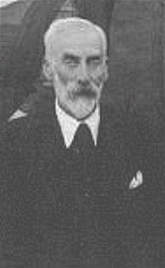 Benjamin Mansell Ramsey (Ref. 2) Benjamin Mansell Ramsey (Ref. 2)
Benjamin Mansell Ramsey wrote the text for "Teach Me Thy Way, O Lord" based on Psalm 27:11 and several additional Scripture verses. Mr. Ramsey also composed the tune, "Camacha," which we use today when singing this hymn.
Benjamin Mansell Ramsey (1849 - 1923) was an English organist and amateur composer (Ref. 1). He also was a well-known music teacher near Bournemouth, England. Mr. Ramsey composed songs, piano pieces, and carols. He also wrote works on music theory (Ref. 2). Wikipedia reports that Mr. Ramsey also conducted an amateur orchestra in the 1880s, and was involved in establishing the Bournemouth Municipal Orchestra in 1893 (Ref. 1). He is best known for his hymn tune, "Camacha," and the text he wrote for "Teach Me Thy Way, O Lord" in 1919. For those of you who are interested in geography, Bournemouth is located on the south coast of England (see map, Ref. 3). Scripture Allusions
I suggest that you refer to the attached hymn sheet music for the following discussion of the Scripture verses and the hymn text (Ref. 4).
"Teach me Thy way." Mr. Ramsey skillfully wrote this hymn around the Biblical phrase, "Teach me Thy way." He included the phrase, "Teach me Thy way," 13 times in verses one through four. In the Old Testament, the Way of the Lord referred to keeping God's commandments (Deuteronomy 5:33, Ref. 5). In Joseph Benson's Commentary, the phrase "Teach me Thy way, O Lord" means "What course I shall take to please thee, and to discharge my duty, and to save myself from ruin" (Ref. 6). David, the Psalmist, asked God to teach him God's way in Psalm 27:11 and Psalm 86:11. Psalm 25:4-5 is similar. David’s request to God, "Teach me Thy way, O Lord," is an excellent example for us to follow (Ref. 5). "Thy guiding grace afford" (hymn, verse 1). These words call to my mind Jesus' promise in John 16:13, "But when He, the Spirit of truth, comes, He will guide you into all the truth." Jesus promised us as believers that the Holy Spirit will guide us. The Greek word for guide in John 16:13 is hodégeó, which literally means "to show the way" (Ref. 7, Ref. 8). Now we can see the close connection between the prayerful hymn words in verse 1, "Teach me Thy way, O Lord" and "Thy guiding grace afford." As believers in Christ, we need the Holy Spirit's guidance to teach us God's way and truth in each of our life's circumstances.
"Help me to walk aright, more by faith, less by sight" (hymn, verse 1). This hymn phrase likely refers to Paul's statement in 2 Corinthians 5:7, "For we walk by faith, not by sight."
"Make Thou my pathway plain" (hymn, verse 3). Psalm 27:11 begins with the words, "Teach me thy way, O Lord" and ends with the words, "and lead me in a plain path, because of mine enemies" (KJV translation). The transliteration of the Hebrew word for plain is mishor (Ref. 9). In Psalm 27:11, mishor means literally a level place (free from obstacles) and figuratively, a place of safety, comfort, prosperity (Ref. 9). In the literal sense, a plain is a level area or plateau as compared to a mountainous area, for example, 1 Kings 20:22-25. In the figurative sense, David's prayer to make his pathway plain (Psalm 27:11) was to request that God would make his way safe (Ref. 10).
Mr. Ramsey wrote in verse 3 of the hymn, "Shine through the cloud and rain, through sorrow, toil, and pain; Make Thou my pathway plain, teach me Thy way!" With these words, we pray that God will make our way safe and that God will comfort us through these difficult times.
"Until the race is won" and "Until the crown is won" (hymn, verse 4). Mr. Ramsey likely drew inspiration from 1 Corinthians 9:24-25 which alludes to both of these phrases. "Don’t you know that the runners in a stadium all race, but only one receives the prize? Run in such a way to win the prize. Now everyone who competes exercises self-control in everything. However, they do it to receive a crown that will fade away, but we a crown that will never fade away."
Let us resolve to run the race with endurance that God has given us, fixing our eyes on Jesus, the author and perfecter of faith (Hebrews 12:1-2).
Listen. I suggest that you listen to one or both of the following Youtube videos to hear examples of how the hymn can be sung.
Traditional hymn in 3/4 time - The Metropolitan Tabernacle, London congregation singing "Teach Me Thy Way, O Lord" - Click here. This contemporary, 4/4 time solo arrangement of "Teach Me Thy Way, O Lord" in 4/4 time will uplift you. Click here.
Apply. In what aspect of your life today do you need God to remove obstacles and to make your pathway plain or safe? Pray and ask God to teach you his way and to give you his guidance.
References
1. https://en.wikipedia.org/wiki/B._Mansell_Ramsey 2. http://www.hymntime.com/tch/bio/r/a/m/ramsey_bm.htm 3. https://www.worldatlas.com/eu/gb/eng/where-is-bournemouth.html 4. https://library.timelesstruths.org/music/Teach_Me_Thy_Way_O_Lord/ 5. http://www.scriptureway.com/home/the-way-of-the-lord-old-testament 6. https://biblehub.com/commentaries/benson/psalms/27.htm 7. https://biblehub.com/greek/3594.htm 8. http://www.scriptureway.com/home/the-spirit-of-truth 9. https://biblehub.com/hebrew/4334.htm 10. https://biblehub.com/commentaries/cambridge/psalms/27.htm
Jesus said to him, “I am the way, and the truth, and the life; no one comes to the Father but through Me." (John 14:6)
This article is the fifth and final article in the series on the topic, "About the Way."
Consider. The eternal Jesus Christ, the Son of God, is the way to the Father and to the Father's dwelling place in heaven.
On the night before his crucifixion and departure, Jesus told his disciples, "In My Father’s house are many rooms; if that were not so, I would have told you, because I am going there to prepare a place for you. And if I go and prepare a place for you, I am coming again and will take you to Myself, so that where I am, there you also will be. And you know the way where I am going" (John 14:2-4). Thomas said to Him, "Lord, we do not know where You are going; how do we know the way?" (John 14:5) Jesus replied with his famous declaration, "I am the way, and the truth, and the life; no one comes to the Father except through Me" (John 14:6). Jesus is the way -- the road, the path, the journey -- to the Father
When Jesus said to his disciples that he was the way, the "way" was a concept that was familiar to his disciples (Ref. 1). In the Old Testament, God instructed the Israelites to walk in his way by keeping his commandments (Deuteronomy 5:33). During the Exodus, God went before the Israelites in a pillar of cloud to show them the way they should go (Exodus 13:21). David prayed, "Teach me your way, O Lord" (Psalm 27:11).
In the New Testament, the main Greek word for way is hodos (Ref. 2). Hodos means a way, road, journey, or path (Ref. 2). When Jesus said, "I am the way," he was saying that he, and he only is the way, road, journey, or path to the Father. In John 14:6, Jesus emphatically used the pronoun "I," meaning "I, and none besides Me" (Ref. 3). "He, and He only is the means through which men can approach to the Father" (Ref. 3). Recall that in Isaiah 43:11 God said: "I, only I, am the Lord, And there is no savior besides Me." The world may try other methods to reach the Father -- for example, trusting in works. Yet, no person can come to the Father -- obtain his favor, access his throne by prayer, and finally to enter his kingdom -- except by the merits of the Lord Jesus Christ (Ref. 4). That is why believing and trusting in Jesus is the way, the only way, to the Father and to his dwelling place in heaven.
Apply. Believe in (trust in, put your faith in) Jesus Christ who is the way, the truth, and the life (John 14:6). Jesus will lead you on the way -- the road, the path, the journey -- to your heavenly Father and to your ultimate destination in heaven.
Related Lessons
"About the Way" "What Does 'The Way' Mean in the New Testament?" - Matthew 7:13-14 "The Way of the Lord (Old Testament)" - Deuteronomy 5:33
References
1. https://www.scriptureway.com/home/the-way-of-the-lord-old-testament 2. https://biblehub.com/greek/3598.htm 3. https://biblehub.com/commentaries/ellicott/john/14.htm Ellicott's Commentary on John 14:6 4. https://biblehub.com/commentaries/barnes/john/14.htm Barnes Notes on the Bible, John 14:6
"Enter through the narrow gate; for the gate is wide and the way is broad that leads to destruction, and there are many who enter through it. For the gate is small and the way is narrow that leads to life, and there are few who find it" (Matthew 7:13-14). Consider. In the Old Testament, the scriptures describe God’s way as keeping God’s commandments (Deuteronomy 5:33, Deuteronomy 5:1-21, Deuteronomy 8:6, Psalm 119:1-3). The New Testament builds upon the description of God’s Way in the Old Testament. In the New Testament, the main Greek word for "way" is hodos (Ref. 1). The following paragraphs describe the meaning of "way" (hodos) in the New Testament. A "way" is a traveled road (Matthew 2:12, Acts 8:26, Acts 26:13). In Matthew 7:13-14 Jesus taught a challenging truth. The way [road] that leads to life is narrow, and there are few who find it. The Greek word for life in this verse is zoe, which means the blessing of real life after the resurrection (John 11:25, Ref. 2). A "way" is a journey. In Acts 8:39, the Ethiopian eunuch went on his way rejoicing after Philip led him to believe in Jesus Christ as the Son of God (Acts 8:30-37). A "way" is a manner of thinking, feeling, or deciding. Acts 18:24-25 describes the teaching and speaking ministry of Apollos, who was instructed in the way of the Lord, though he knew only the baptism of John. Acts 18:26 tells us, "He began to speak boldly in the synagogue, but when Priscilla and Aquila heard him, they took him aside and explained to him the way of God more accurately." (italics added) In Acts 16:16-18, Paul and Silas were near Philippi when they encountered a slave girl who had a spirit of divination. Acts 16:17 tells us the slave girl's remarkable statement. "She followed Paul and us, crying out, 'These men are servants of the Most High God, who proclaim to you the way of salvation.'" (italics added) The name for Christianity in the early church. Many believers today may not know that in the Book of Acts "The Way" was the most widely known name for the early Christian church. The first use in Acts of the name, "The Way," occurs in Acts 9:1-2. "Now Saul, still breathing threats and murder against the disciples of the Lord, went to the high priest, and asked for letters from him to the synagogues at Damascus, so that if he found any belonging to the Way, both men and women, he might bring them bound to Jerusalem." Acts 19:8-9 describes how the Apostle Paul in Ephesus moved the disciples to another location when "hardened and disobedient" people spoke evil about the Way. Acts 19:23 says "About that time there occurred no small disturbance concerning the Way." The disturbance about the Way led to the near-riot in Ephesus described in Acts 19:23-41. Later, when Paul was brought under Roman custody to Caesarea, he testified before Felix, the governor. When Paul was given the opportunity to speak at the hearing, he said, "This I admit to you, that according to the Way which they call a sect I do serve the God of our fathers, believing everything that is in accordance with the Law and that is written in the Prophets" (Acts 24:14). In comparison to "The Way," which is mentioned several times in Acts, the term, "Christian," is mentioned only three times in the entire New Testament (Acts 11:26, Acts 26:28, 1 Peter 4:16). Apply. Are you living on the narrow path that leads to real life beyond the resurrection? Do you trust in Jesus Christ as your Lord and Savior? Related Lessons
"The Way of the Lord (Old Testament)" -- Deuteronomy 5:33 "Jesus is the Way to the Father" -- John 14:6
"You shall walk in all the way that the Lord your God has commanded you, that you may live, and that it may go well with you, and that you may live long in the land that you shall possess." (Deuteronomy 5:33) Consider. Jesus said "I am the way" (John 14:6). The "way of the Lord" was a concept familiar to Jesus' Jewish listeners. Consider these principles from the Old Testament. What was the way that God had commanded? Please read through the Ten Commandments (Deuteronomy 5:1-21). Consider the three-fold blessing God promises for the nations and people who keep his commandments – "that you may live, and that it may go well with you, and that you may live long in the land which you shall possess" (Deuteronomy 5:33).  Gettysburg National Military Park Path with Psalm 25:4 - Photo by Whitney V. Myers Gettysburg National Military Park Path with Psalm 25:4 - Photo by Whitney V. Myers David asked God to "Teach me Thy way, O Lord." "Teach me your way, O Lord, and lead me on a level path because of my enemies" (Psalm 27:11). "Make me to know your ways, O Lord; teach me your paths" (Psalm 25:4). David’s request to God, "Teach me Thy way, O Lord," is an excellent example for us to follow. Apply. Are you walking in the way of the Lord? Are you obeying God's commandments? Deuteronomy 5:1-21 Related Lessons "What Does 'the Way' Mean in the New Testament?" "Psalm 37:5 Meaning - Commit Your Way to the Lord" To learn more about the following topics, please visit the About the Way page or the previous posts with dates noted:
|
Daily Bible Verse(Click the link above) AuthorMr. Whitney V. Myers. Christian. For more information, please visit the Author Page. Posting ScheduleI plan to provide new postings about once a month. Planned Topics(subject to change) Recent Posts(most recent three months) Popular Posts(top 10) Categories
All
Archives
July 2024
|
|
Copyright 2018-2024 Whitney V. Myers |
Listed in Feedspot's Top 100 Bible Study Blogs and Websites |

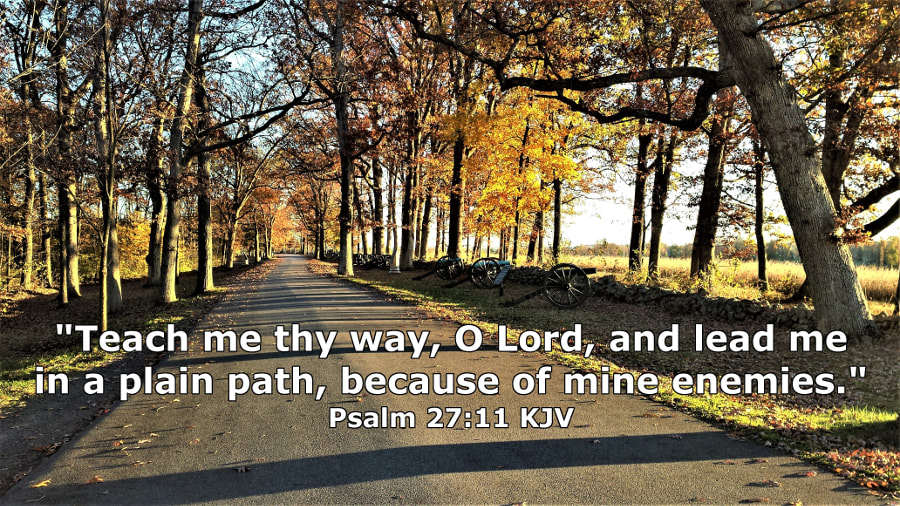
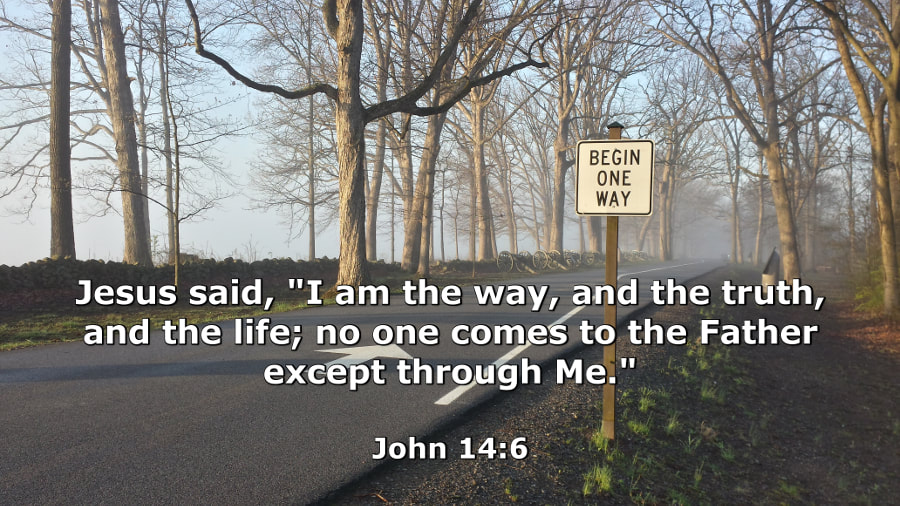
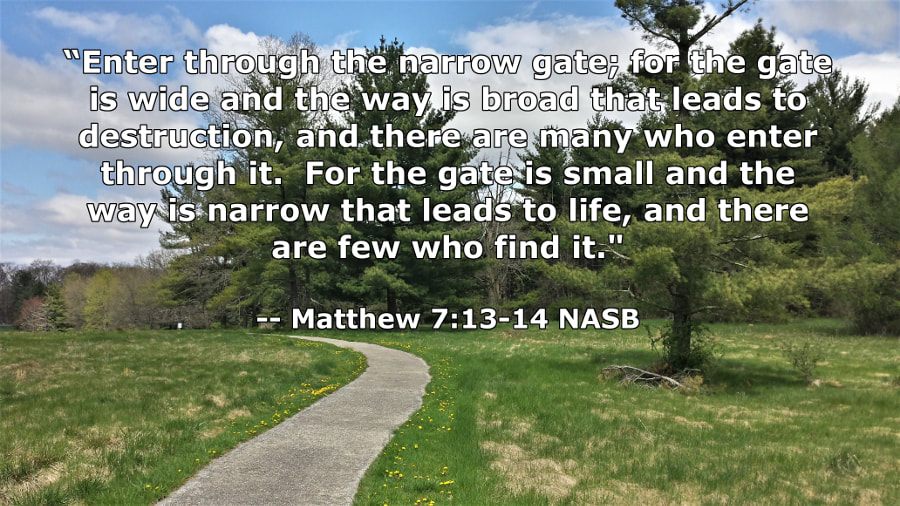
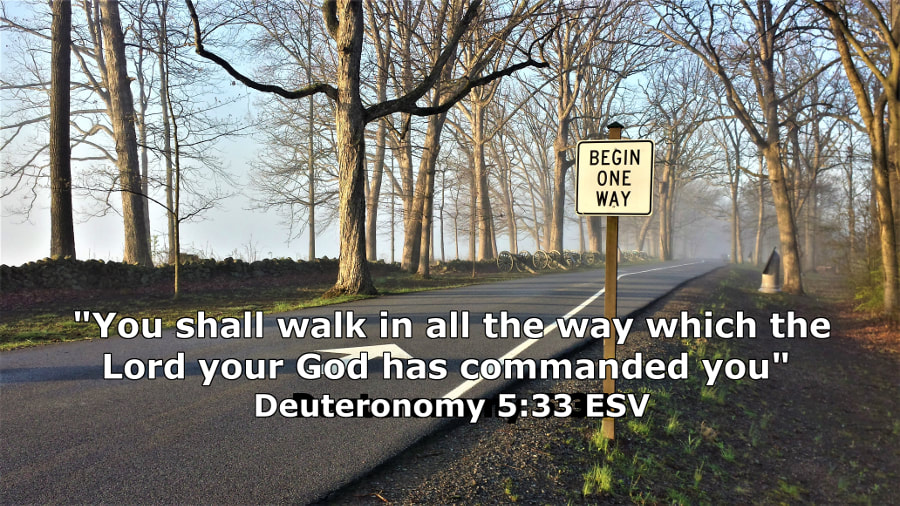
 RSS Feed
RSS Feed
